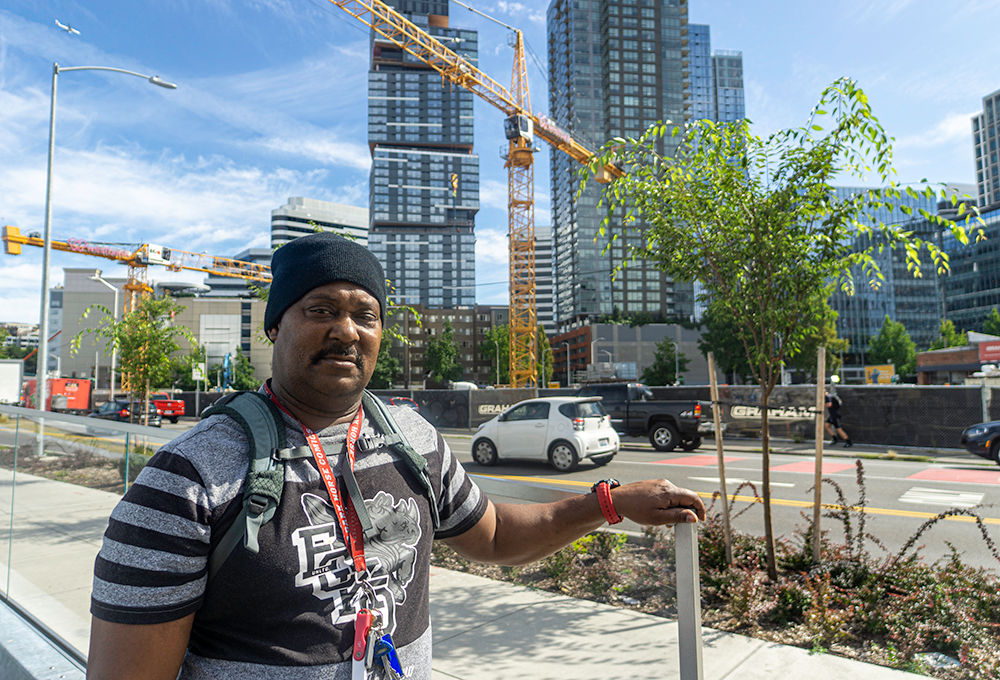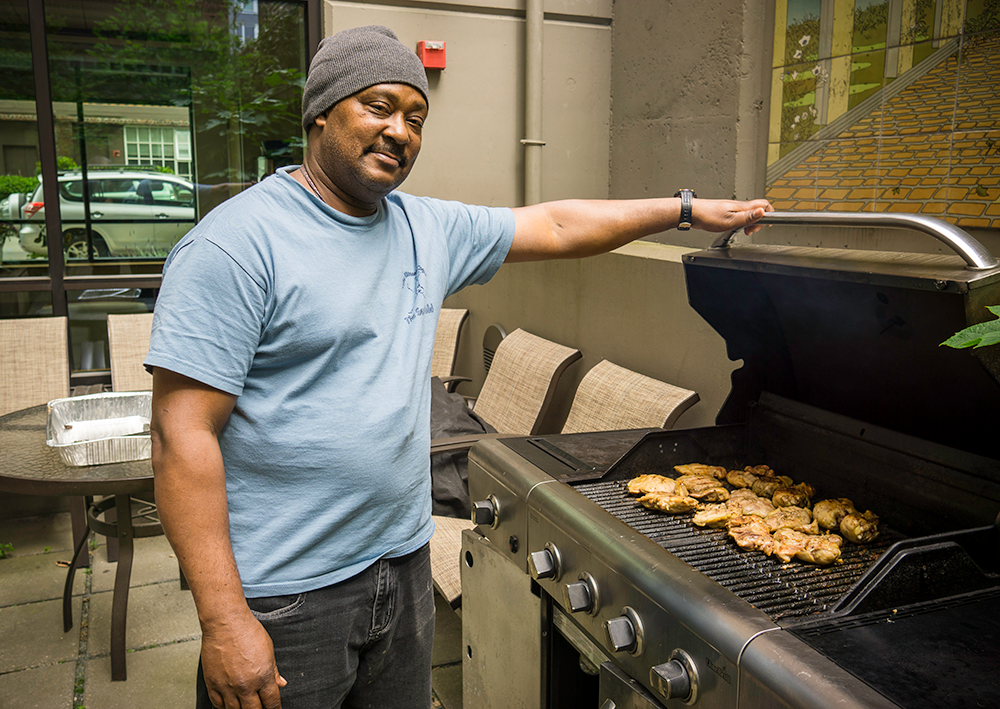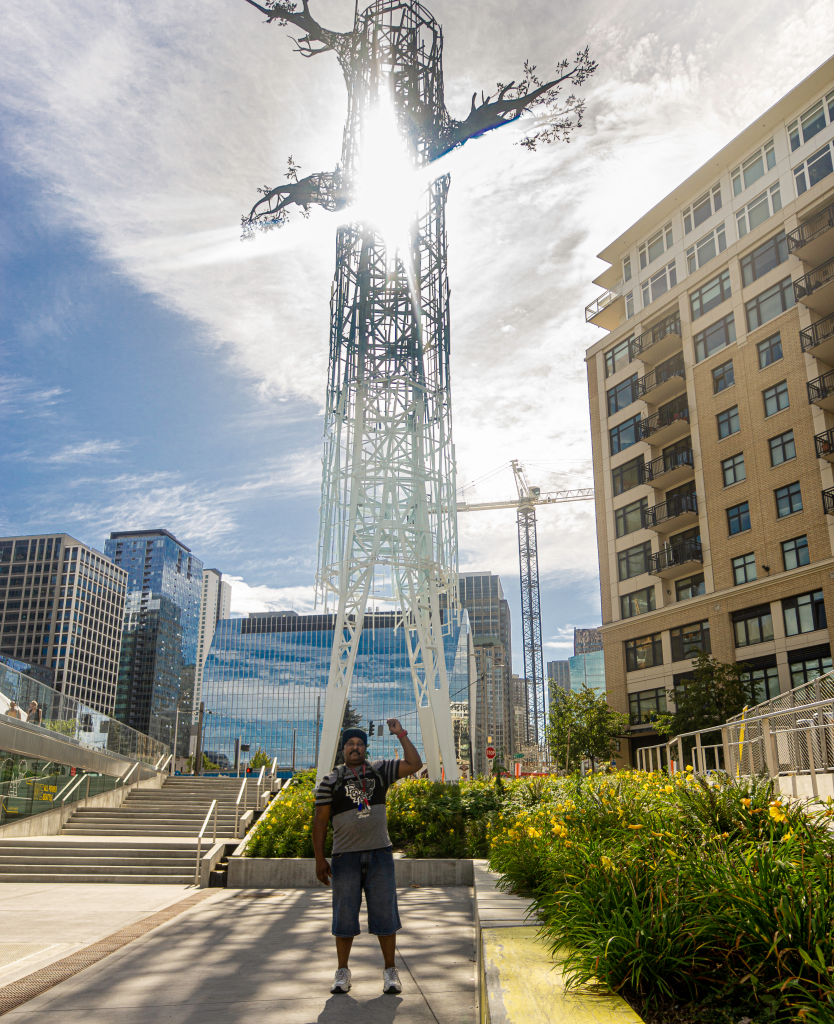“I’ve watched good things happen to this building, to these people,” Rickey says. He’s an observant person, the kind who notices things that others might not, like just how expertly the janitor at his building works.
Rickey was one of the first residents to move into the Pat Williams Apartments when it opened in South Lake Union in 2013. In the six years since, he’s witnessed all kinds of transformations, including to the neighborhood.

Rickey outside in his neighborhood, South Lake Union. (Photo by Jorge Lausell.)
“This area was really old and they changed the whole thing,” he explained. “You wouldn’t have ever thought the things that they tore down were there, considering the way it looks now.”
But most important are the transformations that take place inside the building.
“I’ve seen quiet people here go places, y’know. Be more of a citizen. When they didn’t want to come out, they came out on their own, like a turtle coming out of its shell. I mean, it worked for them. It worked for me,” he smiles.
Long before he came to Plymouth, Rickey made a living at a downtown Seattle restaurant. Unfortunately, he cracked his pelvis, and the injury meant he could no longer work. “They put me on permanent retirement, you see, because it can really damage me in the future. And it does, it hurts… it makes you feel like all your energy is gone.”
After that, Rickey fell into homelessness for four years. During that time, he moved from shelter to shelter until he was offered a home at the Pat Williams Apartments, where he has stayed ever since.
“I really like it here,” he says, nodding. “They really lifted me up off my feet and gave me a good opportunity to get myself going.”

Rickey manning the grill in his apartment building’s courtyard. (Photo by Jorge Lausell.)
The Williams is entirely dedicated to residents who want to leave substance use behind. Community is a key part of their recovery.
“In the group discussion we have on Tuesdays, they say ‘Be open minded.’ Everybody in that group talk about the things they have gone through, and drugs, the problems they’ve had and the successes they’ve accomplished while they’re here. We pay close attention to people speaking, because they be honest, they be open about what happened to them, how they gone through something.”
Thanks to Rickey’s hard work in the program and the compassionate community, he’s been able to maintain his sobriety and thrive.
“I stopped everything. I mean, air is good enough for me. [I’m] doing the things that I’ve been wanting to do for years.”
Now, he can focus on his passion: art. He paints scenes that were documented in the earliest photographs, incorporating other photos from the same time periods into the backgrounds of his works.
And when he’s not working on his paintings, Rickey gives back to his community by being a good neighbor and supporting Plymouth staff, whether that’s by cleaning up after an event, showing up to support Plymouth at City Hall, or checking in with staff each day to see if he can help in little ways.
“All through the year, they do a lot for us. We in turn, just as a tenant and a citizen, even if they say we can’t, like to do something for the staff.”
To Rickey, it seems like it’s just the right thing to do, especially when he sees the same work being done by the people around him.
“Community means unity. Pulling together their resources and talking and working together… I’ve seen people have problems here and other people that [aren’t] necessarily counselors—counselors and tenants—talk out their problems. I’ve seen tenants help other tenants. I help other tenants. I’ve seen counselors help other counselors… I’ve seen them help a lot, which is a good thing.”
At the end of our conversation, Rickey stepped out of the quiet building and into an overcast morning. He stood beside another resident as they talked, laughed, and took the ever-changing city in.

Rickey posing in front of the 110-foot sculpture “Transforest,” which was completed earlier this year. (Photo by Jorge Lausell.)